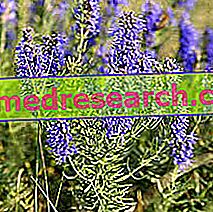
Scientific name
Hyssopus officinalis
Family
Labiatae
Origin
Asia, Europe
Used Parts
Drug consisting of flowering tops
Chemical constituents
- Flavonoids;
- Triterpenes (marrubiina, oleanoico acid);
- Essential oil (pinene, camphene, pinocanfone, isopinocanfone).
Hyssop in Herbalist: Hyssop Property
Hyssop infusions have always been used for their balsamic and bronchodilator activity, but these uses are not found in controlled clinical studies. Attention because the essential oil, due to the presence of ketones, is potentially neurotoxic (epilepsy).
Biological activity
As mentioned, hyssop is attributed to balsamic, bronchodilator and expectorant properties; for this reason - although its use has not obtained official approval for any type of therapeutic indication - it is not uncommon for this plant to be included in the composition of dietary supplements recommended to promote well-being and airway function.
Hyssop is also associated with stimulant, tonic and eupeptic properties.
Most of the aforementioned activities are attributable to the essential oil contained in the plant; however, this oil should be used with caution as it contains neurotoxic ketones with epileptogenic and seizure activity.
Finally, the extracts of hyssop leaves have also been shown to possess antibacterial, antiviral (in particular, against Herpes simplex ) and mildly spasmolytic activity.
Hyssop in folk medicine and homeopathy
In folk medicine, hyssop is used internally to stimulate the appetite and promote digestive processes, to stimulate circulation and as a remedy to combat colds and respiratory tract diseases.
Externally, however, traditional medicine uses hyssop as a disinfectant remedy to be used in the case of wounds, or it uses it in preparations for gargling that are used to counteract a sore throat.
Hyssop is also used in the homeopathic field, where it can be found in the form of granules, mother tinctures and oral drops.
Homeopathic medicine uses this plant in case of bronchial pathologies accompanied by abundant secretions, fat cough, mild digestive disorders, flatulence and digestive colic.
The amount of homeopathic remedy to be taken can vary greatly from individual to individual, also depending on the type of disorder that needs to be treated and depending on the type of preparation and homeopathic dilution that you want to use.
Side effects
If used properly, hyssop should not cause any adverse effects.
However, in some rare cases - following the ingestion by adult patients of 10-30 drops of essential oil for several consecutive days - tonic-clonic seizures have occurred.
Contraindications
Avoid the use of hyssop in case of ascertained hypersensitivity towards one or more components.
Furthermore, the use of hyssop and its preparations is also contraindicated in pregnancy and during lactation.
Pharmacological Interactions
- not known



